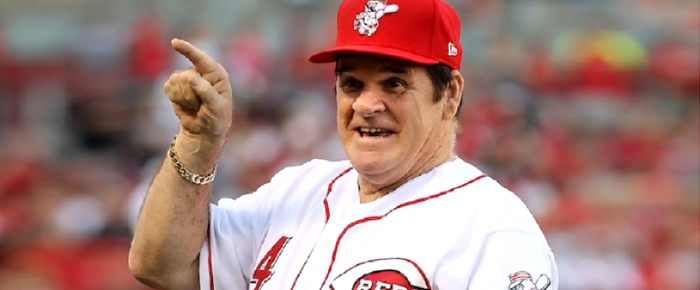
By Flint Wheeler
It’s over now. If Pete Rose’s reinstatement bid had any life before Monday (and that was unlikely), it’s really dead now. Mike Bertolini’s long-lost notebook — the one the feds had, but wouldn’t share with Baseball, the notebook that indicates clearly that Rose bet on the game as a player – is the smoking gun that will relegate to sad history the Hit King’s quest to return to baseball legitimacy.
Former federal prosecutor John Dowd said to ESPN, “This is the final piece of the puzzle. This is it, this does it. This closes the door.”
You can speculate on how ESPN came to possess the scarlet notebook. After it was obtained by postal service inspectors during a raid at Bertolini’s house more than 26 years ago, it had been sealed and stored at the National Archives. Dowd, Baseball’s lead sleuth in the Rose case, had asked to see it in 1989, and had been denied.
You can wonder about the timing of the notebook’s availability, so close to Cincinnati’s All-Star Game, and at a time when Baseball commissioner Rob Manfred supposedly is “re-evaluating” Rose’s case.
It’s irrelevant. If ESPN hadn’t gotten it, another entity would have. In fact, former Rose associates and bet runners Paul Janszen and Tommy Gioiosa have spent the last two decades openly telling folks, media included, that Rose bet on the Reds while still playing. As long ago as September 2001, Gioiosa was telling Vanity Fair magazine that he ran baseball bets for Rose in 1986, when Rose was the Reds player-manager.
This sinks the formerly unsinkable Pete for good. It dismisses the notion that Rose would outlast MLB the way he outlasted Ty Cobb. He has been caught lying again. Not only to Baseball, but to all who have supported his return to the game’s good graces.
Enough is enough, it seems.
“I don’t think he understands how to get out of the quicksand,” said Janszen, who is still haunted by the friendship. “There’s nobody in his life that will say, ‘Pete, we gotta talk’.”
Rose’s story is a personal tragedy. It’s a national disappointment, too.
We love second acts in America. Pete never gave us a chance to love his.
He told the truth in dribs and drabs. He didn’t bet on baseball. He didn’t bet on baseball as a player. He paid his taxes. And so on. Said Janszen, “Rose has only been honest to the degree he needs to be. That makes him his own worst enemy.”
Janszen was a bouncer, a bodybuilder and not a nice guy when he and Rose ran together in the late 80s. In the years since, he has changed his ways.
Janszen went to Baseball in early 1989 about Rose’s gambling, because Rose owed him $30,000. “I had an axe to grind,” Janszen says. “But I’ve learned what doing the right thing means. I started out with a vindictive spirit, but I’ve learned what it really means to have integrity.”
It’s a lesson Janszen wishes his former friend had learned.
“Pete’s a sad sack, he really is. And he could have been so much more. There are people all over the place who are broken. That a Pete Rose could have come clean and said, ‘Look what I did, but I’m on track now,’ that could have helped so many people. You know the power he can have over people.”
That Rose chose not to leaves him with mostly regrets. You can see it on the news today, after the notebook’s contents have been revealed. You can see it in Rose`s face, too, and in the way he moves. The bad knees aren’t the only things that have him limping.
Major League Baseball’s all-time hits leader, Pete Rose, reminisces with Enquirer columnist Paul Daugherty at BoldFace Park in the Sedamsville neighborhood of Cincinnati on, Rose spoke candidly about his upbringing near the banks of the Ohio River, his family, multi-sport youth career and the lessons of his father, whom he credits with making him the player he was. Sad, with steroids, P.E.D.’s, wife-beating and legal shenanigans surrounding all aspects of the world of sports that one who is truly a legend pays the ultimate penalty for something that now-a-days may seem pretty innocent.








































